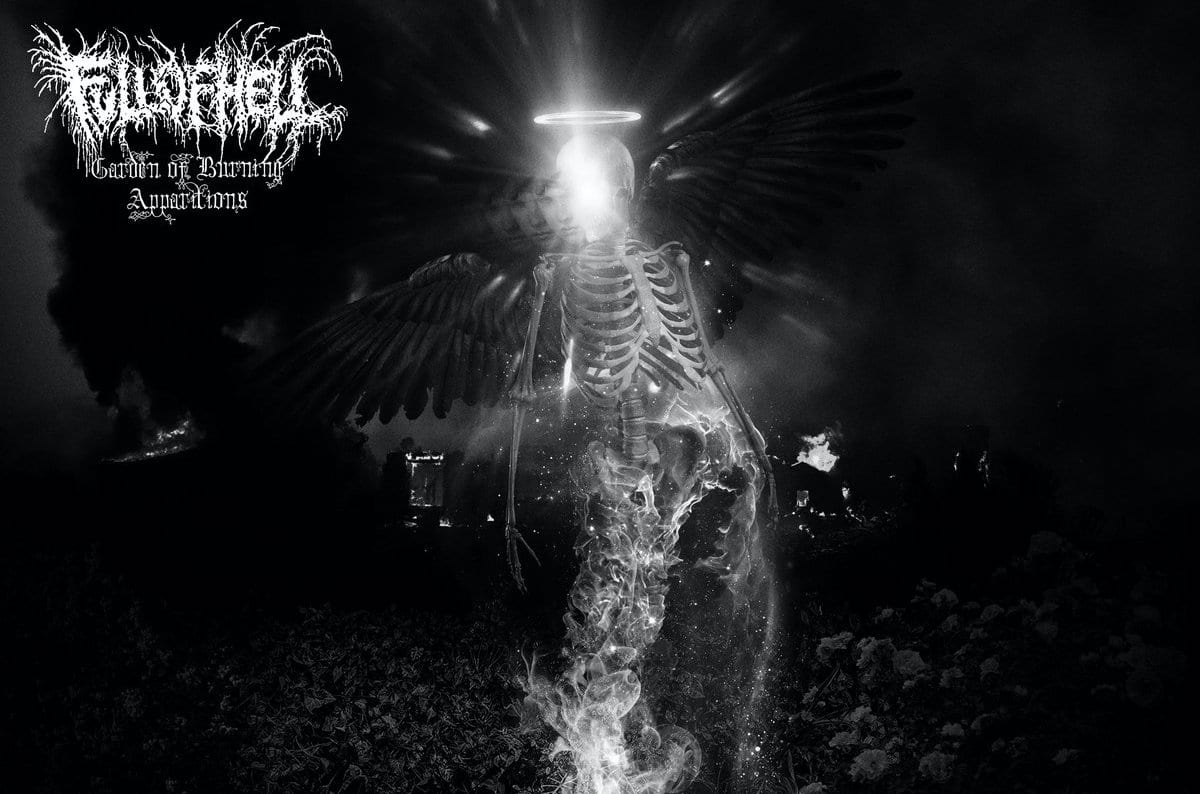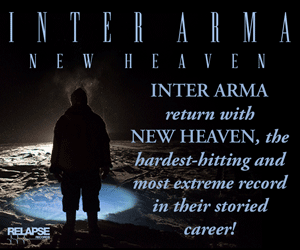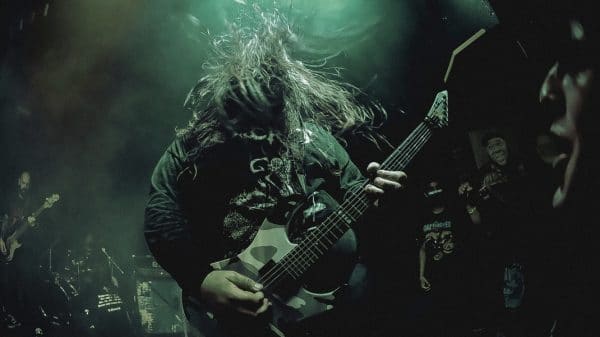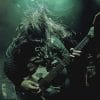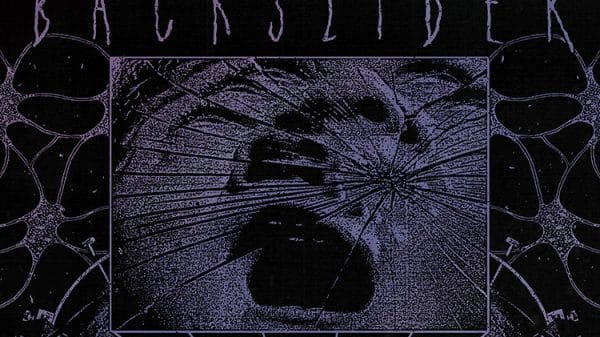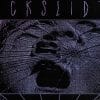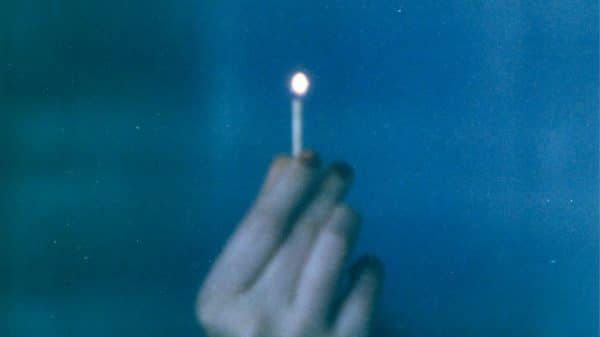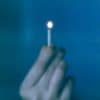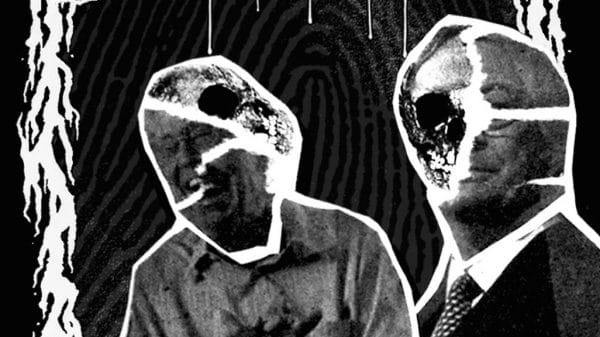On paper, Full of Hell shouldn’t have become the monumental pillar of heavy music that they are today. Any marketing director, any talent promoter, would have looked at early Full of Hell, an anomalous mix of early emoviolence, lo-fi harsh noise, Norwegian black metal, and Canadian crust, and they would have said the band was “neither here nor there.” To whom do you market a band that borrows from nearly everything but fits in nowhere stylistically?
Fortunately for the band and even more fortunately for the world of heavy music at large, the band has persisted and survived, grown and thrived, due in large part to their DIY punk ethic, their artistic ingenuity, and their ability to stay focused on their own vision without allowing it to be clouded by the ebbs and flows of musical trends and stylistic gatekeeping. Consequently, on Garden of Burning Apparitions, the long-time listener finds a group of musicians who, 12 years after their debut EP, are freer than any artistic collective can hope to be, unaffected by the vicissitudes of the mercurial musical masses and bound only by the limits of their own creative ambitions.
If early Full of Hell was hard to put in a box, Garden of Burning Apparitions find the band a much larger beast, unrestrained, wild, and trackable only by the massive imprint it leaves when it treads over all that feels familiar and comfortable. While Full of Hell is sturdier than ever in their unique sonic pocket, while they are heavier than ever in their delivery, they are also reaching their tentacles further across the musical landscape, plundering and pillaging to add to their vast stores of musical wealth. The inclusion of Shoshana Rosenberg and Ryan Bloomer on bass clarinet and electronics, respectively, along with bassist Sam DiGristine’s serving double-duty as saxophonist, makes this one of the most genre-furthering albums in grind since Chepang‘s Chatta.
From the first moments of album-opener, “Guided Blight,” the listener hears the band introducing more mathematical riffing, a technical approach that beautifully counterbalances the bestial shrieks, roars, and gurgles of vocalist Dylan Walker, whose vocal versatility at this point might only be compared to Travis Ryan‘s. This interplay between the cerebral songcraft and thick-foreheaded brute strength continues on “Asphyxiant Blessing,” which features a surprising deconstructed coda of mid-tempo horns and noise.
Forever exploring new sonic terrain, Spencer Hazard and DiGristine’s riff construction on this album is transcendent. The chord voicings in the intro to the bull-in-a-china-shop track that is “Murmuring Foul Spring” evinces the overall jazziness of the album. A Martian metronome, Dave Bland’s distinctive approach to drumming never stops growing and diversifying, now including as much Tony Williams and Jon Theodore as it does Adam Jarvis and Mick Harris.
“Derelict Satellite” truly sounds as though a tool shed full of mechanical roosters and contact mics has been caught in a tornado with a lone, panicked stowaway still inside. “Burning Apparition” builds on the special blend of blackened deathgrind that the band has curated over their powerful career, and its transition into the deconstructed “Eroding Shell,” a track that sounds like a fleet of Sherman tanks falling apart at the bolts as they roll onto the battlefield, is a perfect encapsulation of the polychromatic sounds the band has at their skilled fingertips.
“All Bells Ringing” begins like The Fall of Troy and The Blood Brothers if they were formed in the Upside Down, a hellish, violent post-hardcore that gradually dissolves into the soundtrack for a documentary on venomous arachnids. As soon as one has adjusted to the pizzicato anxiety of the track’s outro, though, “Urchin Thrones” erupts in a cannonade of impossible guitar, bass, and drumming playing. This track is bonded to the first single “Industrial Messiah Complex” through heavy use of transformed vocals and horns, the latter of which recalls John Zorn, Skerik, and Colin Stetson had they toured with Column of Heaven.
“Reeking Tunnels” is relatively spare, a Laughing Hyenas-meets-Lightning Bolt-meets-The Dillinger Escape Plan track that highlights more melody and furthering genre-distorting from a band that has been having its way with the rules of “no rules” music for over a decade. “Non-Atomism” features the kind of black-box-maydays-run-through-a-burning-tape-deck noise that still make Full of Hell’s early noise tapes such a highly sought artifact.
Album closer, “Celestial Heresiarch,” is a song that demonstrates, in case nothing before it does, that Full of Hell’s greatest influence is its own creative drive and ambition, its own ability to ignore the imaginary borders of genre and style. The track begins with the frenetic catharsis that has won the dedicated adoration of countless fans, but it quickly evolves into a reverberating, stadium-large marching anthem, a gargantuan crescendo that is the only way one can imagine ending not only this album, but the loosely tied trio of albums that is Trumpeting Ecstasy, Weeping Choir, and the career-defining apogee that is Garden of Burning Apparitions.
Though still relatively young, the band is solidly at a place in their career where their tenure and impact mean they are more often listed as influencing other bands than being influenced by them, the musical palette is broader and more colorful on this release than on anything before. With four musicians who have a special kind of exploratory spirit and creative restlessness, Garden of Burning Apparitions benefits from the members’ forays into other projects, such as Jarhead Fertilizer, Sore Dream, Sightless Pit, Ramuh, Industrial Hazard, and Eye Flys. Thanks to these excursions over the years, Full of Hell’s sound is more violent and more chaotic but simultaneously more confident and self-assured. Noisier in both the Masonna sense and the Cherubs sense, grindier in both the Nasum sense and in the Naked City sense, this album is the apotheosis of Full of Hell’s career thus far, and it sets a high standard for any bands under the metal and hardcore umbrellas. This band has become their own lighthouse, one that will no doubt illuminate the path for generations of artists.
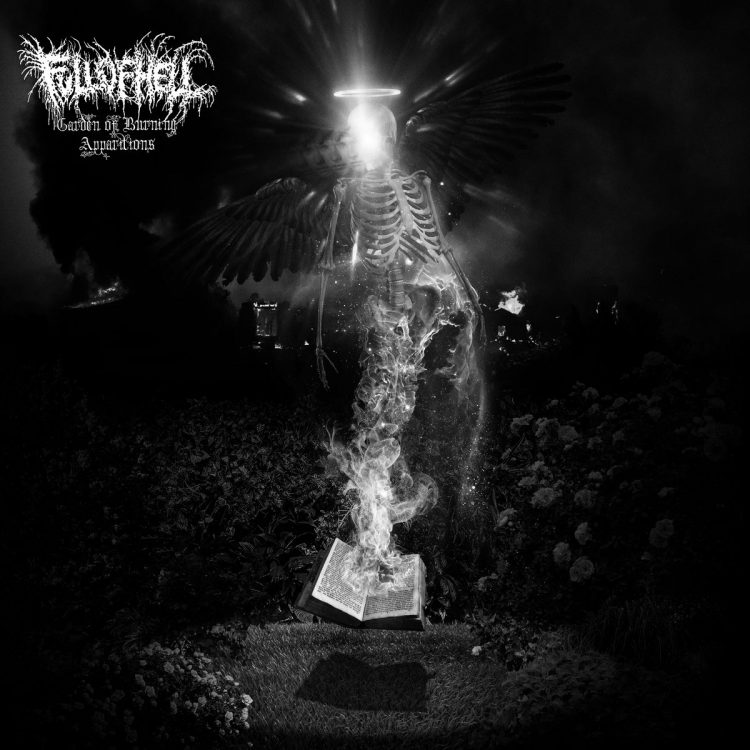
Vocalist Dylan Walker took some time to talk to Cvlt Nation about the album.
You’ve developed a dedicated, enthusiastic fan base thanks to your dedication to touring, quality releases, and interactivity with your fans. Is writing an album different now that your audience is so large and committed? Do their perceived expectations influence how much you allow yourselves to experiment? Or do you trust them to adapt to new areas you choose to explore?
I think that we are really lucky to be anywhere at all with this band. The funny thing is, it doesn’t really feel much different in terms of audience than before. We don’t really feel like a “big” band, and we don’t always feel like anyone cares, so I don’t think it’s had much impact on us and I can say with certainty that it hasn’t had an effect on our songwriting. We’ve gotten where we are simply by doing exactly what we want to do, so since we exist in such a natural space, it’s just a matter of walking the path that we’ve already set out for ourselves. That isn’t to say that we don’t wonder how each album is going to be received, because that’s not something where we know what to expect, but we’re just doing our thing, so if they get it – cool. If not, who cares?
How have your other projects—e.g., Jarhead Fertilizer, Eye Flys, Sightless Pit, Sore Dream—allowed you to scratch other musical itches? Has your work on those projects influenced this new LP at all?
As we get older and the identity of FOH emerges more into the light for us, we are able to run with these other projects to focus on more specific aspects of extreme music that we enjoy. I know that for myself, SP and SD have been good exercises to make music in a more non-traditional sense, approaching things without guitars and sometimes without any vocalizations feels fresh and challenging. I also know for a fact that Eye Flys definitely had an impact on Spencer’s playing, it allowed him to dive into his interest in noise rock and play with people outside of FOH. It seems like it was a pretty insightful experience overall. So I’m sure in that sense, everything that we learn and experience outside of FOH has to have some kind of impact, even if it’s hard to quantify.
Spencer has been dedicating time over the last couple of years to Industrial Hazard, wherein he creates analog noise devices. Did you integrate these at all in the composition of Garden of Burning Apparitions?
Spencer’s devices were not used on the new record, but we employed a lot of the same techniques he uses in the Industrial Hazard project as well as his builds. On tracks like “Derelict Satellite” and “Non-Atomism,” there’s a definite junk-noise influence and that’s specifically something he brings to the table.
Can you describe the songwriting process for this album?
Because of circumstances in the world, we were able to take our time. I can’t really say whether we needed the time or not, because we had studio time booked before the pandemic even started, so either way we would have finished the record as we always do, but I think it alleviated some of the stress around touring and writing. By eliminating that huge part of what we do, we were able to sit around and mull over what we had written, which wasn’t a bad thing. I think that we get a huge release out of playing live and without that we really relied on the studio for that same outlet, so maybe we valued the time more and it may have translated into the performance? Hard to say though!
What were some of the musical influences for this album? Lyrical influences?
Spencer was really drawing on stuff like Zeni Geva, Human Remains, Harvey Milk, Cop Shoot Cop, etc. Dave’s been on a huge jazz kick for years now, and I think it shows in his playing more than ever. I was just listening to a lot of The Bug, Tony Molina, Griselda, and Amps for Christ, so IDK how that really translated into the album ha. Lyrically, I wasn’t really drawing on anything but my own internal crises this time around. The well’s been deep.
Mark McCoy has worked on the art for the last few Full of Hell full-lengths. Can you talk about your involvement with him? Can you talk about how the aesthetic connects Trumpet, Weeping, and Garden? Are the albums considered companions? In other words, is this a trilogy?
Mark might as well be a member of this band. He’s helped propel us along this path in leaps and bounds, I don’t really think we’d be where we are without his wisdom. We have a good system where he digests my lyrics and interprets them in his own way. “Full of Hell” has essentially become a metaphor for the potential of a human life. Since I’ve been singing about the same shit for over a decade (a recent realization) it hasn’t been too difficult to maintain some interconnectivity. Not just through Trumpeting/Weeping, but through all eras of our discography. I really enjoy trying to revisit themes and ideas and interpret them in new ways, years later. These aren’t things I expect many to notice, but I hope they resonate with those that do. Garden isn’t as carefully tied in as the previous two records, but since there’s a pretty fluid set of themes in our music, you could argue that it’s always connected and there are some more obvious reference points this time around. In the most abstract way, I can explain it, Trumpeting = destruction, Weeping = mourning, Garden = illumination. I can’t say this is a trilogy, but they’re all certainly connected. I’d like people to make their own conclusions!
It seems like Full of Hell has been on tour almost constantly for almost a decade. What was it like to take so much time off of the road? How did the events of the last two years influence your creative process?
It was very strange and neither positive nor negative. We’ve all become so accustomed to this lifestyle where we always have a big trip around the corner, and that’s not even necessarily a good thing. There’s a lot of pressure and anxiety that comes with that and it affects all of our lives. Without it, we lost one of the most important exercises that any of us know in our lives, and it left a big vacuum in its place. Fortunately, we were able to lean into recording projects and other aspects of being in a band because FOH is so 24/7, but the space was still there. On a personal level, it served as an affirmation of why I do what I do, and the question of what I’d do without touring was answered. I’d still be doing this. I’d still love it. That’s a scary thought when you’re touring all the time – “what if it stopped?”… So I think it was good to look that in the face and realize how much it all means. Maybe it’s the soft version of a near-death experience haha.
For production, you worked with Seth Manchester, who has been involved with your collaboration with The Body as well as Sightless Pit and Lingua Ignota releases. What was it like working with him on your new full-length?
It was honestly a blast. Seth is an absolute genius and has a really special touch with the music he works on. It was extremely important for us to work with someone outside of the metal world because we never really viewed ourselves as a normal “metal” band. Seth isn’t interested in making a normal record, and he knew us well enough to know where to push us. I think it’s the start of a long relationship between the band and Machines and honestly, we’ve not even scratched the surface, so I’m very excited to work with him again.
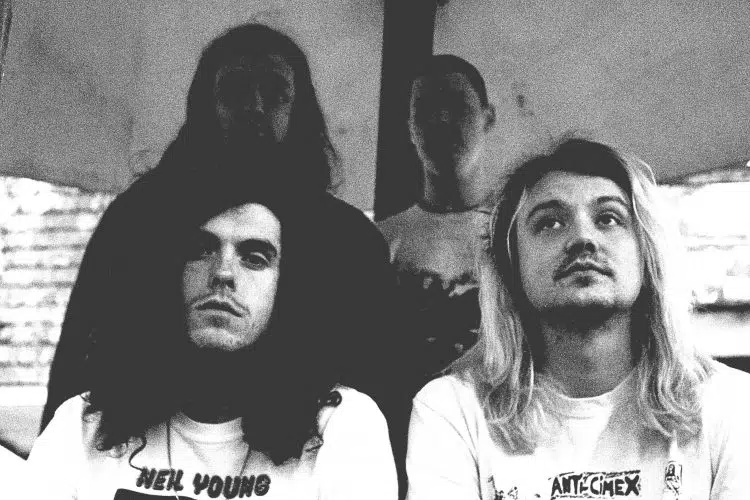
In addition to the album, are there other upcoming projects fans can look forward to?
There’s a new Sightless Pit album coming out next year that I’m really excited about, several Sore Dream records, several Full of Hell records, an EF record (this year), Jarhead BETTER write more music, and I’ve got an entirely new band with an ex-member of Full of Hell that’ll be out of the gate early next year. Spencer also has a couple of new bands in the works as well… Maybe I’m forgetting a few more? IDK. Phew!
What should people know about Full of Hell? About Garden of Burning Apparitions?
I think young people that like our band should know that we are just 4 idiot kids that wanted to do this band more than anything and that they should go out and start a band as well. That’s what it’s always been about. Garden is an honest representation of who we are and what we are about, one step on a long path.
Is there anything else you’d like to say?
Start a band. Go on tour. Mind your own business.
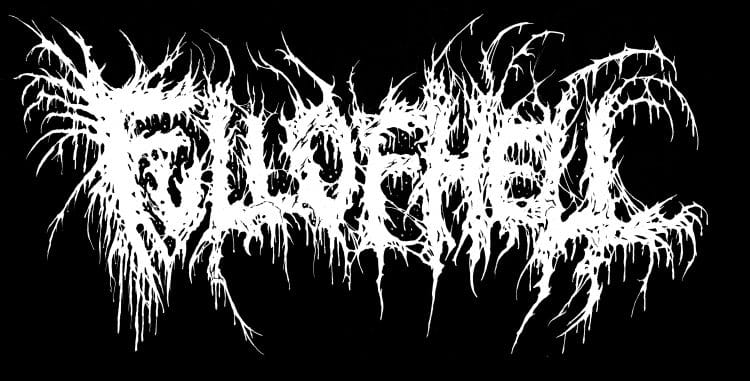
Garden of Burning Apparitions was produced by Seth Manchester at Machines with Magnets and mastered by Adam Gonsalves at Telegraph Mastering.
Pick of Garden of Burning Apparitions at the band’s Bandcamp or at Relapse Records.

